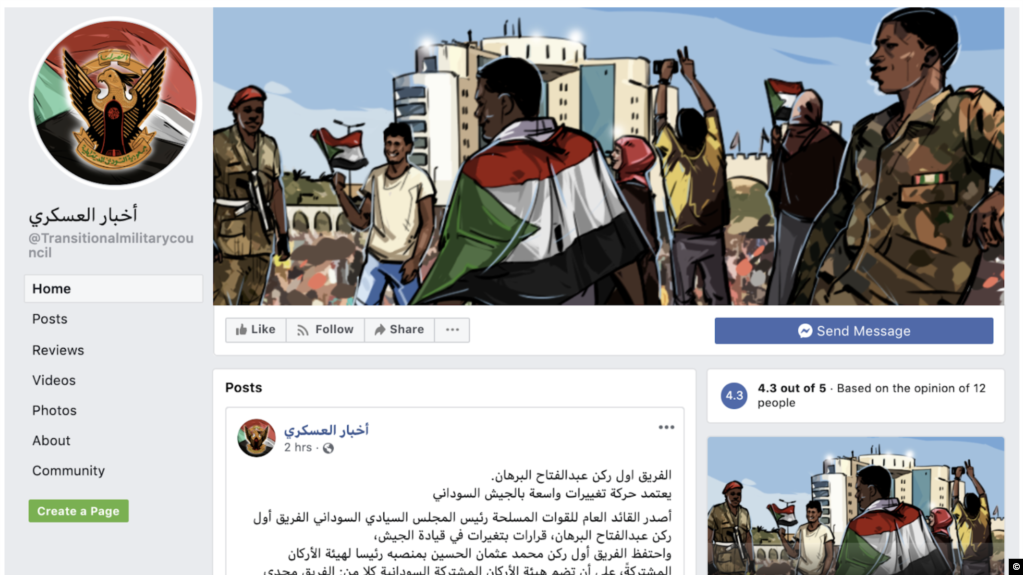
By Polygraph
This week’s takedown of Facebook and Instagram accounts that were used to interfere with African political affairs has provided new insight into the extent to which a close ally of Russian President Vladimir Putin is engaged in the continent, analysts say.
Facebook announced Wednesday that, after a weeks-long investigation, it was removing pages that have been linked to Yevgeny Prigozhin, a Russian businessman accused of financing similar efforts to influence the 2016 U.S. presidential election. The action follows a joint effort between Facebook and researchers at the Stanford Internet Observatory, a group focused on researching new technology.
“Entities linked to Yevgeny Prigozhin are engaged in social media activities in several African countries, to a much wider extent than we’ve previously known,” said Shelby Grossman, a research scholar at the Stanford Internet Observatory and an author of a report on Russia’s online operations in Africa.
“We believe that this is consistent with Russian commercial-linked activities, and to some extent with Russian state political interests as well,” Grossman told VOA in an interview this week.
Prigozhin, commonly called “Putin’s chef” in Russia media, was indicted by Special Counsel Robert Mueller for taking part in a criminal conspiracy in connection with the 2016 U.S. presidential race. The latest allegations involve online activity in Cameroon, the Central African Republic, Côte d’Ivoire, the Democratic Republic of the Congo, Madagascar and Mozambique.
In some cases, Grossman said Russia went as far as hiring local reporters to spread their message. They are “subcontracting out or hiring real local reporters and possibly regional digital marketing firms as well,” Grossman added. “I think this is important because it really increases the hurdles to attribution for these types of inauthentic information campaigns.”
In Russia, Concord Management’s press office responded to Facebook’s move with a rather colorful statement — which was displayed by the Russian news agency Interfax for its Russian-speaking audience:
“Yevgeny Viktorovich (Prigozhin) specifically asked to remind you regarding such statements the old Russian proverb: ‘A sign written on the barn says f… but what lays there is firewood.”
Small investment, big dividend
Facebook said Russia spent around $77,000 in advertising as part of the campaign. The first ad Facebook identified in the report ran in April 2018, and the most recent ad ran in October 2019. But the effort went beyond Facebook.

“These Prigozhin-linked entities are not just using Facebook. They have created Telegram groups and WhatsApp groups, and they, in some cases, created Google Forums to try to engage more closely with citizens,” Grossman said. “One of the pages targeting Mozambique actually ran a contest. So I think those are some of the activities that we see that are new, in particular, in Africa.”
Grossman said the content and style of the pages vary widely by country. In general, they tended to support ruling political parties and deride democratic activists and opposition groups.
For example, in Mozambique, sites supported Frelimo, the country’s longtime ruling party, in advance of elections. In Sudan, Facebook pages initially supported former dictator Omar al-Bashir and then switched to the Transitional Military Council following his ouster.
In Libya, the pages supported both rogue General Khalifa Haftar and his potential political rival, Saif al-Islam, son of autocrat Moammar Gadhafi, killed in 2011 during Arab Spring uprisings. “These pages were interesting in part because many of them posted a lot of Moammar Gadhafi nostalgia content,” Grossman said. “So trying to get Libyans to think about the positive parts of living under Gadhafi’s rule and then throwing in posts that were supportive of his son.”
Often the pages are linked to activity conducted by the Wagner Group, Prigozhin’s military arm, which supplies contractors in several African countries. The private military company Wagner is training and arming militaries in Libya, Mozambique and the Central African Republic, among other places.
Seeking business with ‘unsavory actors’
Cameron Hudson, a senior fellow of the Africa Center at the Atlantic Council, said that, without the ability to make large economic deals, Russia is turning to its military and intelligence capabilities to court influence on the African continent. It is also willing to support regimes that the West will not.
“Russia is willing to do business with a lot of unsavory actors,” he told VOA. “It is willing to do business with regimes that are seeking to hold onto power through unconstitutional methods. It is willing to do business with military governments, governments that Western democracies might not be so quick to embrace. Russia sees itself as having an advantage in going after those markets.”
Hudson said Russia’s aim is to make its presence felt in the same way it did during the Cold War, but with a much smaller investment.
“Russia doesn’t have the political clout, it doesn’t have the ideological clout and it certainly doesn’t have the financial backing to play the role that it played during the Cold War, where it was a heavy investor in development projects in Africa — where ideologically it was bringing African leaders to study the communist model,” he said.
The country believes cyber interference in the affairs of other countries gives it the most bang for its buck, according to Hudson.
“So how does it have its influence felt? Well, it can do it through things like social media and online influence, which is a relatively low-cost way to have the impact on the world stage that they’re looking to have,” he said. “Anything that they can do to undermine the free press, democratic institutions and to sow doubt in the minds of populations, I think, probably plays into their broader vision.”
Salem Solomon is a reporter in VOA’s Africa Division. This news analysis was initially published on Voice of America’s news website on October 31. Polyraph.info staff contributed to this version of the article.
By Polygraph








